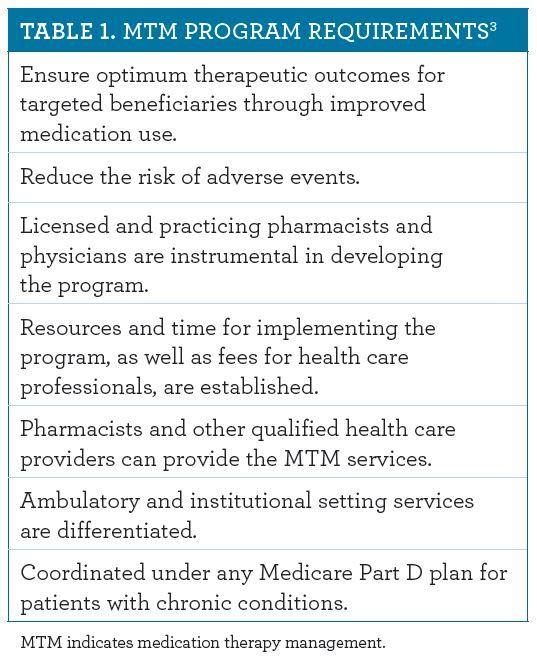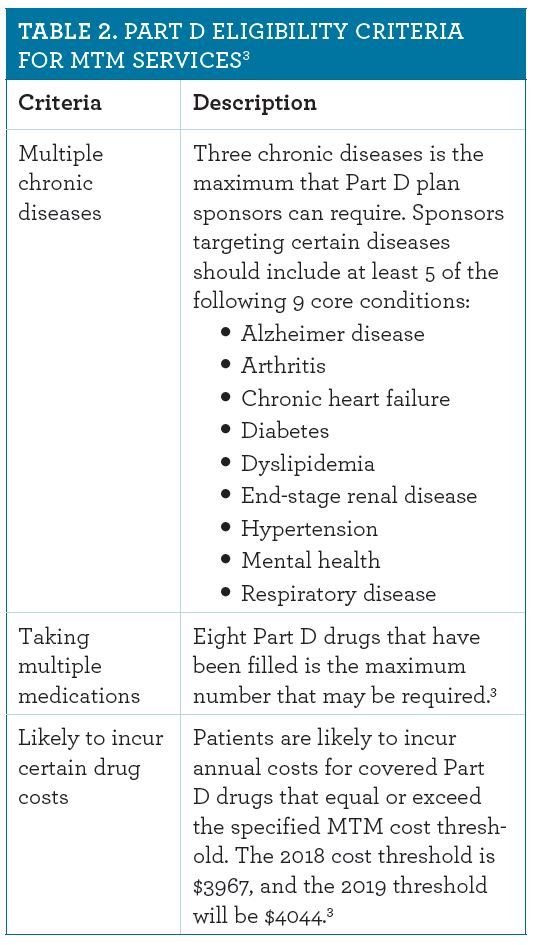
Medication therapy management (MTM) has become an integral part of the pharmacist’s role in disease state management.
Medication therapy management (MTM) has become an integral part of the pharmacist’s role in disease state management. The term “MTM” was first coined following passage of the Medicare Prescription Drug, Improvement, and Modernization Act of 2003 as part of implementing Medicare Part D. 1 The American Pharmacists Association (APhA) helped establish and define MTM and the activities that encompass its services. MTM is also defined as a distinct service or group of services that enhance therapeutic outcomes for patients. 2 These services include medication assessment, identification of drug-related issues, and strategies to resolve problems.
Medicare Part D MTM Requirements
Under §423.153(d), Part D sponsors must have an established MTM program that is incorporated into their plan’s benefit structure (Table 1). 3 Each year, sponsors must also submit a description of their program for review and approval.

Generally, individuals are considered eligible for MTM services under Part D if they meet the following 3 criteria (Table 2) 3 :
Sponsors can also provide MTM services to individuals who do not meet the criteria. Because prescription drug abuse has become a major public health crisis, plan sponsors are encouraged to offer MTM services in instances of opioid overutilization. 3 Initiatives for MTM services that help manage patients with hypertension are also encouraged to improve patient compliance and access to antihypertensive medications. 3

MTM Services
Pharmacists can play an important role in MTM services through various avenues, such as anticoagulation monitoring and dosage adjustments, disease management, immunizations, medication safety surveillance (eg, medication error reporting and monitoring for adverse drug reactions), pharmacogenomics, pharmacotherapy consults, and smoking cessation. 4 Study results have demonstrated that pharmacist involvement in MTM services can improve patient outcomes. A recent study examined telephone and community-based clinical pharmacy services for rural underserved patients in Arizona. 5 Adults with diabetes and/or hypertension participated in the study and received initial MTM telephonic consultations; treatment recommendations were conveyed to the patients’ pharmacists and/or prescribers. The results revealed positive trends in fasting and postprandial blood glucose and diastolic blood pressure. 5
As part of MTM programs, individuals are eligible for a comprehensive medication review (CMR) at least annually, which includes an assessment of both OTC and prescription medications, identification of medication-related problems, and creating an action plan to resolve issues. 3 The CMR can be conducted face-to-face or through a telehealth consultation. Additionally, targeted medication reviews should be performed at least quarterly to assess patients’ medication use. 3
Pharmacist Involvement and Certificate Programs
Pharmacists can become involved with MTM services through various platforms, including Mirixa and OutcomesMTM and receive reimbursement for their associated pharmacies. Obtaining a National Provider Identifier is important for those pharmacists involved in billing for MTM services. Pharmacists have also started collaborating with accountable care organizations (ACOs) and can provide MTM services through their respective pharmacies. 6 ACOs include physicians, hospitals, and other health care providers that offer care to Medicare patients.
MTM certificate programs can provide pharmacists with more in-depth training. The APhA’s Delivering Medication Therapy Management Services involves self-study and a live seminar, while the Power-Pak C.E. Pharmacist Certificate Program in Medication Therapy Management consists of 30 credits involving self-study learning modules.
Jennifer Gershman, PharmD, CPh, is a drug information pharmacist and Pharmacy Times ® contributor who resides in South Florida.
References